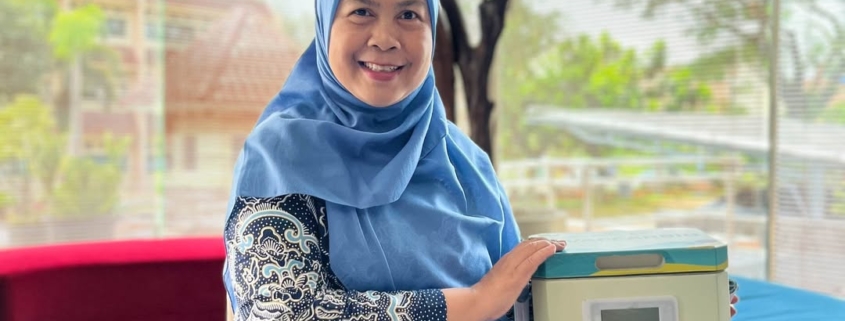Inside VaccarBio: A UII Lecturer’s Innovation to Secure Indonesia’s Vaccine Cold Chain
Amidst Indonesia’s geographical complexities, a lecturer from the Master of Informatics program at Universitas Islam Indonesia (UII), Izzati Muhimmah, S.T., M.Sc., Ph.D., is leading research that could potentially revolutionize the national health distribution system. She is developing VaccarBio, a prototype smart vaccine carrier box designed to be the frontline defense in preserving the quality and efficacy of vaccines to the most remote service points.
The problem this research targets is not trivial. Vaccine quality is highly dependent on temperature stability within a system known as the cold chain. The slightest disturbance, especially fluctuations outside the standard 2-8 degrees Celsius range, can permanently damage the vaccine’s contents. This not only results in financial losses from wasted vaccines but also endangers public health by potentially reducing the effectiveness of immunization programs.
This challenge is exacerbated in an archipelagic nation like Indonesia. The process of distributing vaccines from central warehouses to provinces, then to districts and cities, and finally to Community Health Centers (Puskesmas) or Integrated Health Posts (Posyandu) in remote areas is often lengthy and crosses difficult terrain. It is here, in the “last mile” of distribution, that the cold chain is most vulnerable, where conventional methods often fail to maintain the ideal temperature.
In response to this challenge, VaccarBio emerges as an integrated technological solution. This device is not merely a standard cooling box relying on passive frozen ice packs. VaccarBio is engineered with an active cooling system powered by a portable source, enabling it to independently and consistently maintain the chamber’s temperature according to set standards.
The intelligence of VaccarBio lies in its digital control system. A control panel allows officers to set and monitor the temperature with precision. This feature drastically reduces the risk of human error and provides certainty that the box’s internal environment remains in optimal condition—an assurance difficult to obtain from passive cooling methods.
The next layer of technology is the integration of the Internet of Things (IoT). Each VaccarBio unit is equipped with sensors that track not only temperature but also geographical location (GPS) and device power status. This data is transmitted in real-time to a data center or a monitoring application. Consequently, distribution managers can supervise the journey of every vaccine remotely, identify potential issues before they occur, and ensure full accountability throughout the delivery process.
Izzati Muhimmah, as the lead innovator, stated that the vision behind this project extends beyond simply creating a device. “Hopefully, this technological invention will be beneficial in preserving vaccine quality during distribution to peripheral points,” she remarked. She emphasized that the ultimate goal is to ensure every patient receives the optimal benefits of the vaccine.
By maintaining vaccine quality, the risk of Adverse Events Following Immunization (AEFI/KIPI) that might be caused by damaged vaccines can be minimized. “This is about quality assurance and safety for vaccine recipients across the country,” Izzati added.
The development of VaccarBio is a tangible example of how higher education institutions like UII play an active role in producing solutions for national problems. The project also opens the door wide for collaboration between academia, industry, and government. Students, particularly from the Master of Informatics program, are invited to contribute to further research and development.
Ultimately, innovations like VaccarBio are an investment in the future of Indonesia’s health security. By ensuring every precious dose of vaccine reaches its destination in perfect condition, this technology not only supports routine immunization programs but also enhances the nation’s preparedness in facing potential future pandemics.




